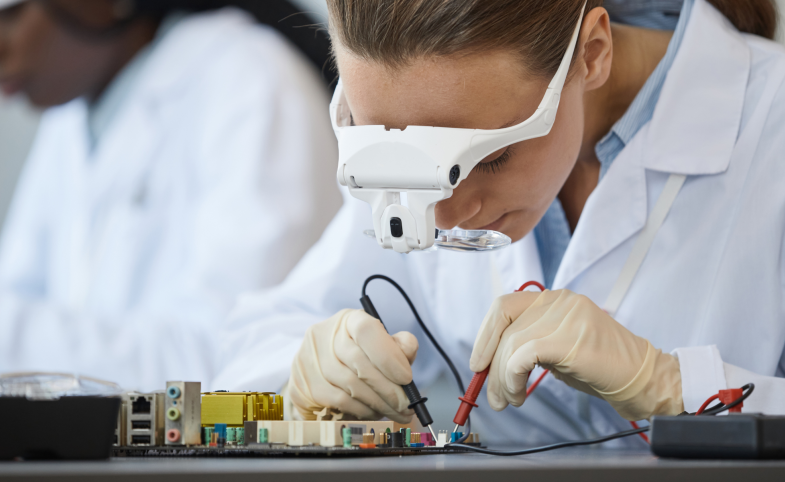With a population of 216 million and a distinct culture of fan fervor, Brazil is a unique region for cultural exchange and diplomacy. American sports teams and entertainers have shown a new dedication to the Brazilian...
KEEP READINGThe CPD Blog is intended to stimulate dialog among scholars and practitioners from around the world in the public diplomacy sphere. The opinions represented here are the authors' own and do not necessarily reflect CPD's views. For blogger guidelines, click here.

TechWomen & the Power of STEM Diplomacy
"TechWomen is where hard science meets soft power, and it’s a key component of U.S. diplomacy’s work to support American strength, prosperity, and safety."
Don’t take my word for it.
Ejiroghene John of Nigeria (TechWomen 2023) is the Founder of the small-but-mighty Teach Girls Tech Foundation and a production engineer by training. She wrote to me: “After TechWomen mentorship I came to realize that Americans are committed to really […] reaching real people in Nigeria. In fact I saw excitement and passion in the IIE team and the mentors and how they were eager to support our tech journeys […] It’s like a little village, a home and family.”
Dr. Zebo Isakova of Uzbekistan (TechWomen 2019) is a professor and currently National Evaluator and Green Economy expert for Linpico SARL in Paris. She shared with me: “TechWomen isn’t just a mentorship program — it’s a global sisterhood, a STEM powerhouse.”
Sylvia Mukasa of Kenya (TechWomen 2014) wrote: “As a 2014 TechWomen Fellow, seeing the program’s funding restored is a deeply emotional moment for me — a testament to the power of global mentorship, resilience, and the unwavering belief that investing in women in STEM transforms lives, industries, and nations.”
American mentors too were overjoyed to see their program saved.
Maryann Hrichak of San Francisco, California, wrote to me: “Smart women, smart tech and smart power: The restoration of the U.S. Dept of State’s TechWomen program ensures that the U.S. will remain competitive in the global economy. My many years of involvement as an impact coach and cultural mentor have already proven the significant contributions in STEM this program has brought and will continue to bring to the table.”
Amy Graff of Chicago, IL shared with me: “In an endless stream of troubling news, TechWomen being restored is a bright and hopeful reprieve. Not only do the world’s most promising leaders get an opportunity to experience the warmth, generosity, and opportunity of the United States, but we mentors benefit too. I’ve learned more about the world, built unbreakable bonds, and been inspired in my own line of work. Above all, I now imagine possibilities for my life that would not have been conceivable without witnessing the accomplishments and drive of these amazing women.”
Ella Morgulis of San Francisco, CA wrote me: “The TechWomen program is about uniting and empowering women around the world, in the U.S. and abroad. When we stood collectively and fought for it, we got the results and demonstrated that we live our values. Strong as ever.”
Katy Dickinson of San José, CA told me: “I am so very glad and relieved that the funding for TechWomen has been restored so that even more inspiring STEM leaders can join us and we can have the honor of mentoring them. Together, TechWomen work together to make the world a better place.”
People often say there is no domestic constituency for foreign aid. But there is a strong domestic constituency for international education. There are 54 Fulbright Association chapters in 38 states in the United States, who have helped to coordinate calls and meetings with Congress since the funding freeze. And even for small programs like TechWomen, there are people across the United States and around the world willing to fight for them as the 13-day fight to save TechWomen has shown.
As volunteers, we fight for these public diplomacy programs not just because they align with our personal values or because participating in them is joyful; for many of us, volunteering for these programs is one way we do our part to protect and defend our country in a complex, frightening world. We know America needs friends to be secure, needs allies to be safe, and needs co-founders, funders, employees, and customers all around the world to be prosperous.
TechWomen, Fulbright, and Gilman all benefit the United States and Americans. Members of Congress have the tools they need to protect them.
It is my sincere hope they continue to use them.
A version of this article was originally published on the Diplomat’s Pouch blog from the Institute for the Study of Diplomacy at Georgetown University in Washington, D.C.
Visit CPD's Online Library
Explore CPD's vast online database featuring the latest books, articles, speeches and information on international organizations dedicated to public diplomacy.
POPULAR ARTICLES
-
March 20
-
March 6
-
March 27
-
March 3
-
April 24
Join the Conversation
Interested in contributing to the CPD Blog? We welcome your posts. Read our guidelines and find out how you can submit blogs and photo essays >.













